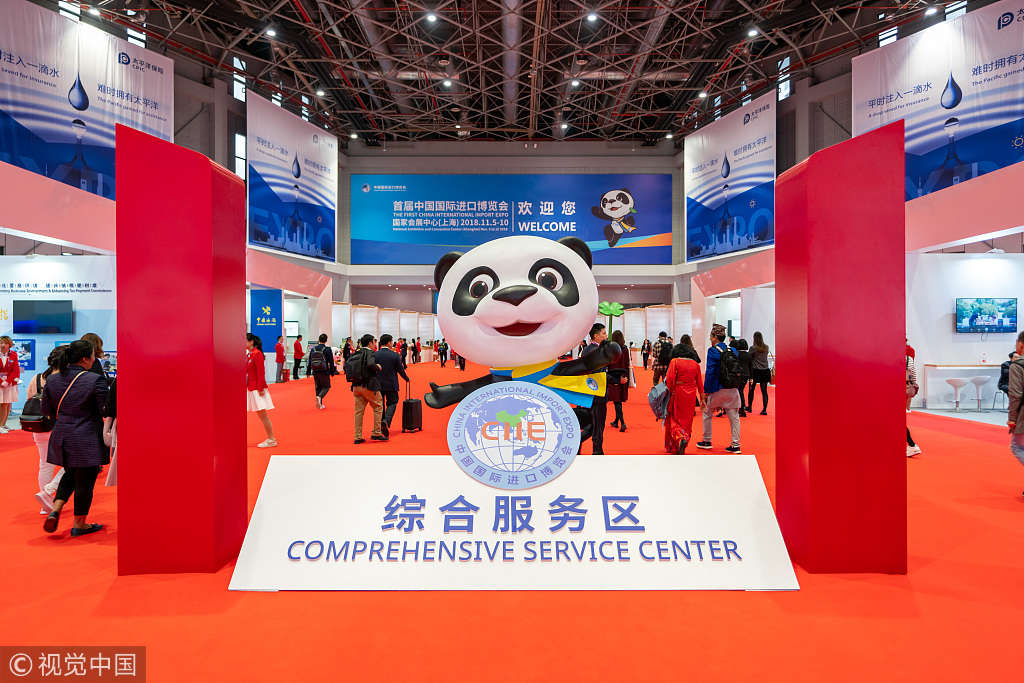Xi shares China's vision for BRI with the world
- By George N. Tzogopoulos
 0 Comment(s)
0 Comment(s) Print
Print E-mail China.org.cn, April 29, 2019
E-mail China.org.cn, April 29, 2019

The Olympic Green in Beijing daily reminds its visitors of the success of the 2008 Olympic and Para-Olympic Games. But since the end of the 2008 Games, the Olympic Park has played host to other significant events as well. The Olympic Green Convention Center, for instance, was transformed into the National Convention Center (CNCC), which regularly hosts high level conferences, including the first Belt and Road Forum (BRF) for International Cooperation in May 2017, and the second BRF last week.
On the sunny morning of April 26, colorful spring flowers outlined the CNCC as participants from around the world arrived to the opening ceremony of the BRF. Heads of state, presidents of international organizations, diplomats, officials, CEOs, academics, experts and journalists were among the distinguished guests.
President Xi Jinping delivered the keynote address, signaling continuity and passion for improvement and enrichment, principally concerning green development and transparency. Two years after the first BRF, he talked about an expanding network of connectivity including six corridors, different routes, multiple countries and ports. Notably, he emphasized, the Belt and Road Initiative (BRI) does not compete with other regional models proposed either by countries or international organizations, but complements them.
The scale of BRI is larger than any of those regional models, however. This means China's responsibility becomes critical – especially in relation to emerging or weak economies. Xi referred, inter alia, to the significance of infrastructure projects that "help countries fully leverage their resource endowment" and "better integrate into the global supply." An idea that was initiated in China has transcended its borders to impact the larger world by creating growth and shared prosperity. It is gradually developing to become the most successful global integration scheme in past decades.
A recent study of the World Bank Group demonstrated that the GDP will increase by up to 3.4% for participating countries in BRI and by up to 2.9% for the world. As Xi reiterated, the BRI remains an inclusive project: even countries that have not joined may have the chance to do so in the future, in order to benefit by trade in an era of rising protectionism.
While the West suspiciously eyes China's role in the world, the Chinese president spoke about the need to meet people's desire for a better life. This is a vision for the future that is appealing for younger generations suffering from poverty and unemployment. In the coming years, China will support extensive collaboration among social organizations to carry out livelihood projects.

Xi also clarified that trade surplus is not an end in itself for his country, thus conveying a message to other countries that they might boost their exports to China. Of course, such increases cannot happen automatically. But China is interested in importing quality agricultural and manufacturing products, as well as services. It is now the turn of interested countries – in the EU for instance – to grasp this opportunity to develop efficient marketing strategies. The second China International Import Expo, taking place this November, should provide a useful platform.
Having placed an emphasis on developing original research for several years, China is becoming a colossus of innovation. The building of the digital Silk Road, which is making real contributions to cyber-connectivity, highlights this advancement. China will finance exchange programs – including for women, young people and individuals with disabilities – to learn about this technological miracle and share findings back home.
Against this backdrop, the framework for protecting the intellectual property rights of companies will be strengthened. In his speech, the Chinese president underscored that this commitment should reassure foreign companies of secure conditions.
Moreover, the Chinese government is well aware of the Western argument related to the so-called "debt trap" in some regions along the BRI routes. But Xi addressed this as well, stating that China has formulated specific principles for the development of the BRI, and has published debt sustainability frameworks to facilitate financing cooperation. If countries hosting Chinese investments or receiving Chinese loans default on those loans, everyone stands to lose. Economic stability in each country safeguards the viability of all deals and agreements.
Last but not least, President Xi's speech reflected the nature of international cooperation he envisages. This is to be based on multilateralism and in line with UN guidelines. The preservation of peace must be and is the utmost goal; it could not be otherwise. The opening ceremony of the second BRF fittingly was given in a spot that historically embodies Olympic Ideals, signifying that these very ideals are and will continue to be respected.
George N. Tzogopoulos is a columnist with China.org.cn. For more information please visit:
http://www.china.org.cn/opinion/GeorgeNTzogopoulos.htm
Opinion articles reflect the views of their authors, not necessarily those of China.org.cn.
If you would like to contribute, please contact us at opinion@china.org.cn.






Go to Forum >>0 Comment(s)